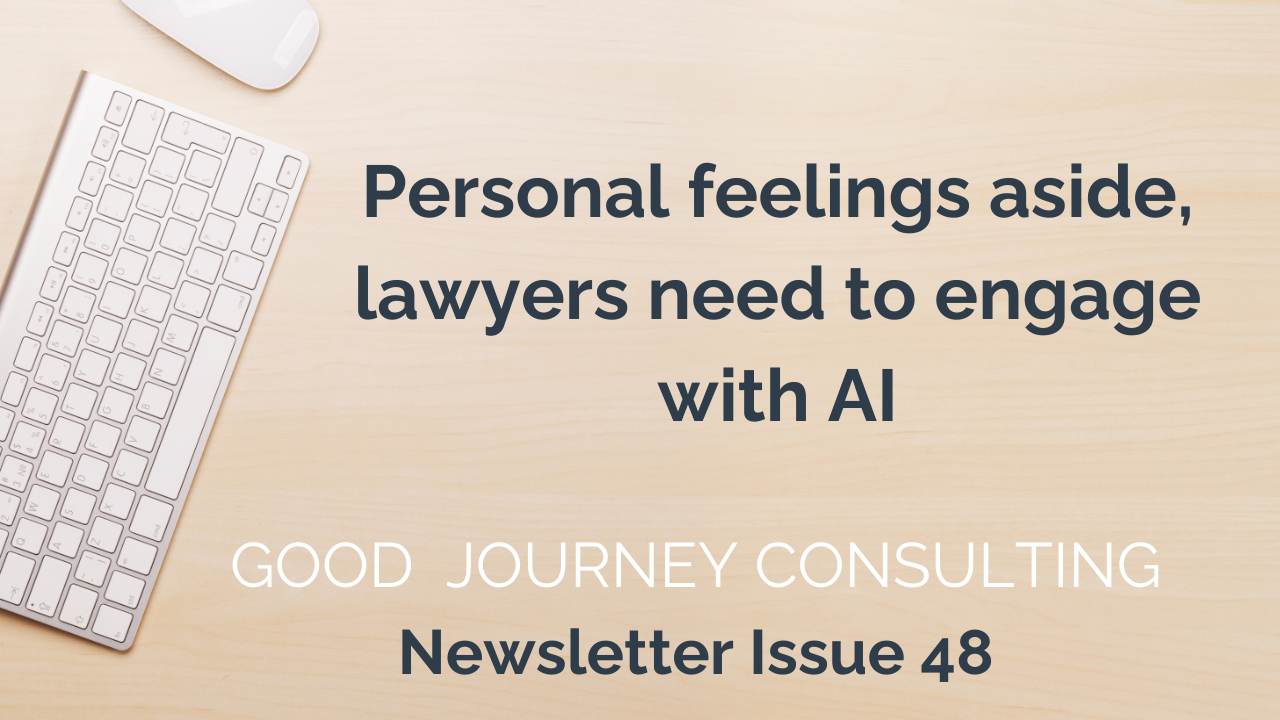Personal feelings aside, lawyers need to engage with AI

Issue 48
In a time with no shortage of hot-button issues, AI ranks near the top of the list. Everyone has an opinion about AI, and most of those opinions are strong. Major AI controversies include (but are certainly not limited to) environmental and existential concerns, and unsettled legal issues.
Given these significant controversies, why is engaging with AI essential for lawyers? Why isn’t it optional?
AI Competency is Part of Lawyer Competency
Comment 8 to the American Bar Association’s (“ABA”) Model Rule 1.1 on lawyer competency explains that lawyers need to keep up with technological changes to the practice of law.[i] In 2019, the ABA adopted a resolution and published a report urging lawyers and courts to address emerging AI issues in relation to practicing law.[ii] The report took the position that staying informed about developing technologies that impact the practice of law, including AI, is a matter of competence.[iii] At least 40 states have adopted the ABA’s duty of technology competence.[iv]
AI Competency is Also a Practical Matter
As a practical matter, even lawyers who don’t practice in a jurisdiction that has adopted a duty of technology competence still need to develop AI competency. One reason lawyers need to develop AI competency as a practical matter is to mitigate the risks associated with shadow AI. Shadow AI is the unauthorized use of AI tools in a workplace. Most lawyers collaborate with others while performing their work. You may have a law clerk or other staff, colleagues, co-counsel, or experts who are using AI improperly, and without your knowledge.
There is another major reason why engaging with AI is not optional for lawyers. Most clients don’t care about whether their lawyer likes AI or fears it. They care about whether their lawyer is prepared to help them with their problems.
If you feel like AI is everywhere these days, you can be sure that many of your clients feel that way too. And that means that some of you have clients who are already experiencing or will experience AI-related legal issues. AI is already raising new issues in many areas of law, including discrimination, healthcare, defamation, wrongful death, privacy, and more. As a practical matter, lawyers also need to develop AI competency to be able to spot their clients’ AI-related legal issues, and be prepared to help them.
If you would like a resource that will help kickstart your development of AI competency, you can read the first chapter of A Lawyer's Practical Guide to AI for free by signing up at this link.
Thanks for being here.
Jennifer Ballard
Good Journey Consulting
P.S. A quick reminder: I’m preparing to release a CLE called “How to Pick the Best AI Tools for Your Law Practice”. Once I release the CLE, I’ll provide my newsletter subscribers with an exclusive discount code. If you already subscribe to my newsletter, thank you! If you know someone who might like access to this discount code for my newsletter subscribers, please share this issue of the newsletter with them, and encourage them to sign up for my newsletter here before the CLE is released. Additionally, if you would like me to prioritize applying for CLE accreditation in your state, please send me an email at [email protected].
[i] Model Rules of Pro. Conduct r. 1.1 at cmt. [8] (Am. Bar Ass’n 1983).
[ii] ABA, Resol. 112, 1 (2019), https://www.americanbar.org/content/dam/aba/directories/policy/annual-2019/112-annual-2019.pdf.
[iii] Id. at 5.
[iv] Tech Competence, LawSites, https://www.lawnext.com/tech-competence (last visited Sept. 17, 2025).
Stay connected with news and updates!
Join our mailing list to receive the latest legal industry AI news and updates.
Don't worry, your information will not be shared.
We will not sell your information.

